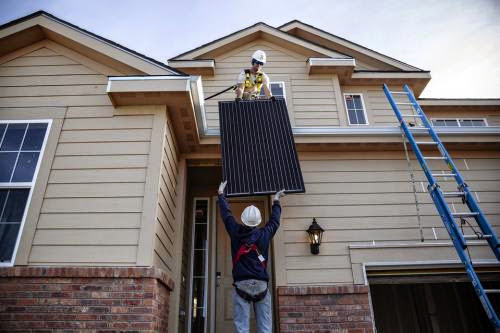SOLAR PANELS ARE STANDARD FOR NEW HOUSES IN SOME AREAS; ELECTRICITY AT 20% OFF Workers install solar panels to generate electricity at a Lennar house in Castle Rock, Colo., last week. NATHAN W. ARMES FOR THE WALL STREET JOURNALBy KRIS HUDSON Dec. 1, 2014 7:48 p.m. ET27 COMMENTS GOLDEN, Colo.-When Donnie and Michelle Holsworth bought a three-bedroom house here in October from builder Lennar Corp., they got more than a home. The purchase included 20 years of cut-rate electricity powered by a Lennar-owned solar system on the roof. Many companies have been trying to make it easier and cheaper for homeowners to generate electricity from the sun, chipping away at the utilities' monopolies. The number of residential solar installations has climbed, aided by their declining cost and government incentives.SEE RELATED VIDEO ON #WORLDSTREAM * David Kaiserman of Lennar Ventures on Building With Solar Now home builders have jumped in. Such systems are less expensive to install during a house's construction than afterward, while some builders offer the cheaper option to lease a system rather than buy one. The moves are applauded by solar advocates, who say the involvement of builders will increase solar usage while eliminating the steep upfront cost of the equipment, which can run from 10,000 to 20,000. "Up to this point, retrofits have been by far the largest portion" of homes with solar power, said Rhone Resch, chief executive of the Solar Energy Industries Association, a trade group. But that could change, he said, as more builders incorporate solar. Few companies have gone as far as Lennar, the nation's second-largest home builder. Consumers shopping for a Lennar home in more than 100 of its developments in California, 11 in Colorado and a handful in Nevada find that almost all the houses have solar panels. The company plans to expand the program to more states, focusing on locations that have programs to encourage renewable energy. "We aren't offering homes with solar as an option-it's a standard feature" in certain communities, said David Kaiserman, president of Lennar Ventures, which oversees the builder's solar project. Lennar allows buyers to decide whether to purchase the system and generate their own electricity, or lease the system from a Lennar subsidiary, which retains ownership of the equipment and sells the power to the homeowner at prices Lennar promises will be 20% cheaper than the local utility's. Those homeowners still must contract with the power company for conventional electricity for times when the solar gear can't generate enough, such as at night and on cloudy days. In addition, when their system generates more power than they use, they often can send the surplus to the public grid and get a credit from the utility. By retaining the solar hardware, Lennar gets to collect the federal and various state rebates for installing it. The federal subsidy gives a 30-cent tax credit for every 1 spent on a system. States like California provide a rebate to cover part of the costs of installing solar. Colorado and others pay solar-power generators, usually homeowners, a subsidy based on how much extra power they produce to be sent to the public grid. The energy savings that homeowners reap from owning the system and getting most of their electricity free often covers the system's cost within five to 10 years, according to the U.S. Department of Energy's National Renewable Energy Laboratory, or NREL. That doesn't include the impact of federal, state and local incentives. However, obtaining a mortgage for a new house equipped with solar can be tricky because the appraisal a bank uses for the mortgage might not value the system at full cost. In contrast, leasing a system-by far the most popular choice among new-home purchasers-lets buyers avoid the costs and hassles of buying one, but they could end up paying more over the long term because they are often locked into contracts that last decades. If a homeowner with a leased system sells the house before the contract expires, the new buyer often must assume the lease. "It's a trade-off," said Robert Margolis, a senior energy analyst at NREL. "A lot of people don't want to put all of the money out upfront," even if it means they "break even several years down the road." Technically, Lennar's offering is a power-purchase agreement rather than a lease because Lennar doesn't charge the customer a monthly rate for the system's use, just for the power. Other solar-leasing companies charge a small monthly fee for leasing a system plus a fee for the power. "Any savings, especially when you buy a new house, is huge," said Mr. Holsworth, a 37-year-old firefighter who bought his solar-equipped house from Lennar in October for 405,000. "Twenty percent off our electricity bill is a monthly discount that we'll get forever." Other builders, including KB Home and Meritage Homes Corp., don't keep ownership of the hardware but opt to either sell the entire system to buyers or let a third-party provider install and operate the solar gear. Meagan and Kevin Randall bought a 462,000 Lennar house near Golden in October, contracting to buy the power from Lennar. The couple opted against buying the hardware out of concern it would become obsolete and lose value during the 20-year contract. Ms. Randall says her family spent 212 a month on average for conventional electricity at their previous house. She expects that will be "cut in half" by buying solar power from Lennar, combined with her new home's better insulation and windows. Write to Kris Hudson at kris.hudson@wsj.com


0 comments:
Post a Comment